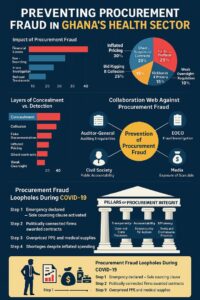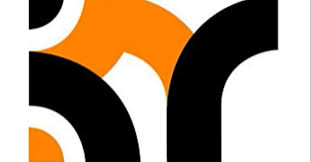Corruption within Ghana’s system for acquiring goods and services in public healthcare is a hidden crisis — a systemic issue that silently drains limited financial resources and leads to tragic loss of life. While well-known health challenges such as malaria, tuberculosis, and maternal mortality require consistent and strategic intervention, procurement corruption slowly but surely erodes the very systems built to respond to these public health needs.
Despite major funding efforts and policy reforms, Ghana’s healthcare sector continues to face bottlenecks — not from lack of ideas or capacity, but due to inefficiencies and irregularities in procurement. According to Ghana’s Auditor-General’s 2021 report, billions of cedis were misused or wasted due to contract violations, poor oversight, and mismanagement. These financial losses translate into under-resourced hospitals, essential drugs and equipment shortages, and loss of public trust. International watchdogs have estimated that between 10% and 25% of global public health spending is lost to corruption — and for countries like Ghana, where budgets are already stretched thin, such losses are catastrophic.

This essay draws from research and practical knowledge in governance and public procurement to explore the scope, drivers, and impact of corruption in Ghana’s healthcare procurement systems. It also offers strategies for identifying and preventing such fraud to ensure that public health resources truly serve the people.
Understanding the Foundations: Ghana’s Health Sector, Financing, and Procurement Structure
Ghana’s healthcare financing is sourced from a blend of public and private contributions. The sector is primarily funded through allocations from the national treasury, donations and grants from international partners, internally generated funds from health institutions, and contributions under the National Health Insurance Scheme (NHIS). Despite this diversified income structure, the sector remains underfunded, with procurement consuming a significant portion of its budget.
Procurement is the lifeline of healthcare delivery. It ensures the acquisition and distribution of essential drugs, medical equipment, and services needed across hospitals and health posts. Its effectiveness directly influences the accessibility, quality, and timeliness of healthcare. However, corruption in this area disrupts supply chains, delays service delivery, and inflates costs — all to the detriment of ordinary Ghanaians.
How Procurement Corruption Manifests
Procurement-related corruption in Ghana’s public health system occurs in various forms — overpricing, bid rigging, kickbacks, ghost contracts, and manipulation of sole-source provisions. In emergency contexts like the COVID-19 pandemic, where speed is prioritised over process, these corrupt practices intensify. Contracts are often awarded without competitive bidding to politically connected companies, leading to inflated prices and substandard deliveries.
The hidden nature of procurement fraud lies in its complexity. Often disguised by bureaucratic paperwork and legal loopholes, these corrupt deals are difficult to detect and even harder to prosecute. Oversight institutions may lack the political backing, independence, or tools to uncover wrongdoing, making corruption a low-risk, high-reward venture for insiders.
Consequences of Procurement Fraud in Health
The impact of corruption on Ghana’s healthcare delivery is severe and far-reaching. When funds meant for medicines are diverted, hospitals run out of supplies. When contracts are awarded to incompetent suppliers, medical devices arrive faulty or late. Ultimately, patients — especially the vulnerable in rural and underserved areas — pay the highest price. They are denied quality care, forced to pay out-of-pocket for basic treatments, or in some tragic cases, lose their lives.
Beyond these immediate harms, procurement fraud damages public confidence in the health system. It breeds cynicism, discourages donor investment, and undermines the credibility of reforms. If left unchecked, it can spiral into a public health catastrophe.
Lessons from the COVID-19 Pandemic
The pandemic was a stress test for Ghana’s procurement system. It highlighted how emergency powers, though necessary, can be abused when not accompanied by accountability. Procurement rules were relaxed to speed up the response, but in the absence of real-time audits and transparency, these exceptions became opportunities for misconduct.
Ghana was not alone in this. Globally, many governments faced similar risks. However, countries with robust digital systems, transparent procurement portals, and strong anti-corruption institutions fared better. Ghana’s experience underscores the need to strengthen institutions — not only during emergencies but as a permanent safeguard.
Recommendations for Reforms and Anti-Corruption Strategies
To combat procurement corruption in Ghana’s public healthcare system, a multifaceted strategy must be adopted. Key recommendations include:
Legal Reform: Review and amend the Public Procurement Act to close loopholes, improve clarity around emergency procurement, and ensure stiffer penalties for misconduct.
Digital Transparency: Accelerate the rollout of e-procurement platforms to reduce human discretion and increase traceability of transactions. Public dashboards should display contracts, suppliers, and pricing in real time.
Independent Oversight: Empower institutions like the Auditor-General’s Office, EOCO, and CHRAJ with the autonomy and resources to investigate procurement fraud without political interference.
Whistleblower Protection: Encourage insider reporting through secure, anonymous channels, and enact laws that protect whistleblowers from retaliation.
Citizen Engagement: Involve civil society organizations and the media in monitoring procurement processes. Social accountability improves compliance and raises awareness.
Leadership and Ethics: Public sector leadership must demonstrate integrity from the top. Training in procurement ethics and anti-corruption should be mandatory for health officials and procurement officers.
Conclusion: A Call to Action
Procurement fraud in Ghana’s public health sector is a silent epidemic. It is less visible than malaria or cholera, yet just as deadly. Every cedi stolen from the health budget represents lives lost, trust eroded, and a future compromised.
However, this crisis is not beyond redemption. With strong leadership, technological innovation, civic oversight, and a renewed commitment to transparency, Ghana can build a healthcare system that truly delivers. Combating procurement corruption is not only a governance issue — it is a moral imperative and a public health necessity.
It is time to act.
By Andy Mintah Yiadom, MLOd


